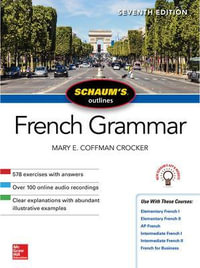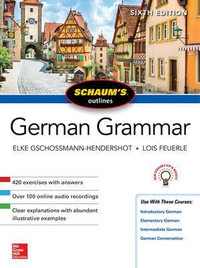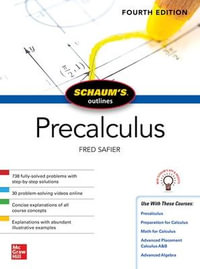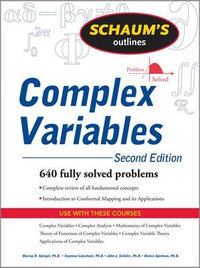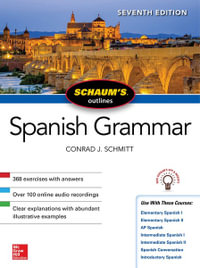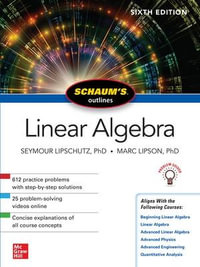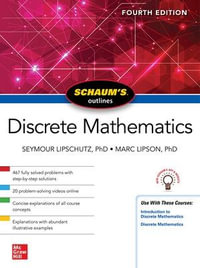
Schaum's Outline of French Grammar
7th Edition
Paperback | 11 October 2018 | Edition Number 7
At a Glance
400 Pages
28 x 21 x 1.5
Paperback
RRP $37.95
$26.75
30%OFF
or 4 interest-free payments of $6.69 with
Fortunately, there's Schaum's. This all-in-one-package includes more than 500 practice exercises to sharpen your problem-solving skills. Plus, you will have access to the revised online Schaum's.com website-it's just like having your own virtual tutor!
You'll find everything you need to build your confidence, skills, and knowledge and achieve highest score possible.
Updated to address the latest course scope and sequence, Schaum's Outline of French Grammar, Seventh Edition provides a systematic review of the language with clear and concise explanations of key grammar concepts. Packed with hands-on exercise, the guide allows you to work on your own-for both initial learning and for review. You'll also get access to a variety of audio recordings online via the new and improved Schaums.com website. Reflecting the most modern usages and topics in French language study, this guide will help you develop a better understanding of the language.
Schaum's Outline of French Grammar, 7th Edition features:
- An accessible outline format that makes learning quick, easy, and thorough
- More than 578 exercises to help you test your skills
- Online audio recordings to reinforce correct pronunciation
- Hundreds of examples with explanations of grammar concepts
- Material that supports the leading French textbooks
- Content that is appropriate for a variety of courses, including Introductory French, Elementary French I, Elementary French II, Intermediate French I, Intermediate French II, French for Business, and AP French
Contents
CHAPTER 1 Nouns and Articles
Gender and the Definite Article
Singular Forms.
Gender Identification by Word Endings
Nouns Indicating Occupations, Nationalities, Relationships and Domestic Animals
Words with Different Meanings in Masculine and Feminine Forms
Plural Forms of Nouns
Regular Plurals.
Nouns Ending in -s, -x or -z.
Nouns Ending in -au, -eau, -eu or -Å"u.
Nouns Ending in -ou.
Nouns Ending in -al.
Nouns Ending in -ail.
Irregular Plurals.
Singular or Plural
Compound Nouns
Special Uses of the Definite Article
With General or Abstract Nouns.
With Titles.
With Languages and Academic Subjects.
With Days of the Week, Seasons, Dates and Time Expressions.
With Names of Continents, Countries, Provinces, Regions, Islands, Mountains and Rivers.
With Weights and Measures.
With Parts of the Body or Clothing.
Omission of the Definite Article
Contractions of the Definite Article
The Indefinite Article
Omission of the Indefinite Article
After the Verb ªtre.
Other Omissions of the Indefinite Article.
The Partitive Article
The Partitive Article Versus the Definite and Indefinite Articles
Exceptions to the Rule for Using the Partitive Article
When the Sentence is Negative.
When an Adjective Precedes a Noun in the Plural.
After Expressions of Quantity and Expressions with de.
CHAPTER 2 Adjectives and Adverbs
Formation of the Feminine of Adjectives
Regular Forms.
Adjectives Ending in a Vowel, Pronounced Consonant or Mute -e.
Adjectives Ending in -el, -eil, -il, -en, -on, -et and -s.
Adjectives Ending in -er.
Adjectives Ending in -x.
Adjectives Ending in -eur.
Adjectives Ending in -f.
Adjectives Ending in -c.
Irregular Adjectives.
The Adjectives beau, nouveau, vieux.
Plural of Adjectives
Regular Forms.
Adjectives Ending in -s or -x.
Adjectives Ending in -eu or -eau.
Adjectives Ending in -al.
Agreement Problems of Certain Adjectives
Adjectives of Color.
Compound Adjectives
Position of Adjectives
Adjectives That Change Meaning According to Position
Formation of Adverbs
Regular Forms.
Adverbs Formed from Adjectives Ending in a Vowel.
Adverbs Ending in -©ment.
Adverbs Ending in -amment and -emment.
Irregular Adverbs.
Position of Adverbs
Comparison of Adjectives and Adverbs
Regular Comparisons.
Comparative Followed by a Noun.
Superlative of Adjectives and Adverbs
Irregular Comparatives and Superlatives
Adjectives without Comparative and Superlative Forms.
Useful Phrases with Comparatives and Superlatives.
Possessive Adjectives
Use of the Definite Article as a Possessive.
With on, personne, tout le monde.
With chacun.
Demonstrative Adjectives
Indefinite Adjectives
CHAPTER 3 Prepositions
Uses of Certain Prepositions
Prepositions to Indicate Location or Direction to or from a Place
, de, dans, en, chez.
Prepositions with Geographical Names
.
En.
Au.
Dans.
De.
Prepositions with Modes of Transportation
Prepositions with Expressions of Time
, at.
Dans, en, in.
Avant, before and apr¨s, after.
Prepositions Used to Join Two Nouns
To Indicate Function or to Join a Noun that Modifies Another Noun.
To Mean with.
To Introduce the Material from Which an Object is Made.
Prepositions of Cause
Prepositions After Indefinite Pronouns
Prepositions in Adverbial Clauses of Manner
Prepositions to Introduce an Infinitive Depending on a Noun or Adjective
To Indicate Function, Result or Tendency.
After Expressions of Duration, Length of Time and Position of the Body.
CHAPTER 4 Numbers, Dates, Time
Numbers
Cardinal Numbers.
Ordinal Numbers.
Collective Numbers.
Fractions.
Arithmetical Operations.
Dimensions.
Dates
Time
CHAPTER 5 Verbs
Moods and Tenses
Subject Personal Pronouns
The Present Tense
First Conjugation Verbs.
Verbs Beginning with a Vowel.
Verbs with Spelling Changes:
Verbs ending in -cer and -ger;
Verbs with -©- in the infinitive;
Verbs with -e- in the infinitive;
Verbs with -yer in the infinitive.
Second Conjugation Verbs.
Third Conjugation Verbs.
Irregular Verbs:
Verbs like ouvrir;
Verbs like courir, rire, rompre, conclure;
Battre and mettre;
Verbs like partir;
Vaincre;
Verbs like conna®tre;
Plaire and se taire.
Verbs with Infinitives Ending in -ire:
Lire, dire, conduire, traduire;
crire, vivre, suivre;
Croire, voir and mourir;
Verbs like craindre, peindre, joindre;
Verbs like prendre;
Venir and tenir;
Acqu©rir and conqu©rir;
Pouvoir, vouloir, pleuvoir;
Boire, devoir, recevoir;
Avoir;
tre;
Aller;
Faire;
Savoir;
Valoir and falloir.
Special Uses of the Present Tense:
Depuis, il y a ... que, voil ... que, and §a fait ... que plus the present tense;
Venir de plus the infinitive.
Reflexive / Pronominal Verbs
Sâasseoir.
Reflexive Verbs with Parts of the Body.
Reflexive versus Nonreflexive Verbs.
Reflexive Verbs in the Infinitive.
Imperatives
Affirmative Imperatives.
The Affirmative Imperative of Reflexive Verbs.
The Negative Imperative.
The Negative Imperative of Reflexive Verbs.
The Present Participle
Formation.
Use.
The Imperfect Tense
Regular Forms.
Verbs with Spelling Changes.
tre.
Uses of the Imperfect Tense
Continuing or Habitual Action.
With Verbs Denoting Mental Activity or Conditions.
Descriptions in the Past.
Si and the Imperfect Tense.
Depuis, il y avait... que, voil ... que, §a faisait... que and the Imperfect Tense.
Venir de in the Imperfect Tense.
The Conversational Past Tense (Pass© Compos©) of Verbs Conjugated with Avoir
The Pass© Compos© of -er Verbs.
The Pass© Compos© of -ir Verbs.
The Pass© Compos© of -re Verbs.
Irregular Past Participles:
Past participle ending in -©;
Past participle ending in -i, -is, -it;
Past participle ending in -ait;
Past participles ending in -u;
Past participles ending in -ert;
Past participle of verbs ending in -indre.
Agreement of the Past Participle with Verbs Conjugated with avoir.
The Pass© Compos© of Verbs Conjugated with tre
Monter, descendre, sortir, entrer, rentrer with ªtre and avoir in the Pass© Compos©.
Passer with ªtre and avoir in the Pass© Compos©.
The Pass© Compos© of Reflexive Verbs.
Agreement of the Past Participle with Reflexive Pronouns.
Uses of the Pass© Compos©
Present Perfect.
Past Action.
Differences between the Pass© Compos© and the Imperfect Tense:
Specific action versus habitual or continuing action;
With souvent, parfois, quelquefois;
Specific action versus ongoing action;
Events versus background;
Verbs with different meanings in the imperfect and pass© compos©.
The Literary Past Tense (Pass© Simple)
The Pass© Simple of -er Verbs.
The Pass© Simple of -ir and -re Verbs.
Irregular Verbs Building the Pass© Simple upon the Past Participle:
Verbs with past participles ending in -i;
Verbs with past participles ending in -i plus a consonant;
Verbs with past participles ending in -u.
Irregular Verbs not Building the Pass© Simple upon the Past Participle.
The Future
Aller with an Infinitive.
Regular Forms of the Future Tense.
Verbs Using the Third Person Singular Form of the Present Tense as the Future Stem:
Verbs ending in -yer;
Verbs with -e- in the infinitive.
Verbs with Irregular Future Stems.
Special Uses of the Future Tense:
After certain conjunctions;
After penser que, savoir que, esp©rer que, ne pas savoir si and in indirect discourse;
To express probability.
The Conditional
Formation of the Present Conditional.
Uses of the Conditional:
To express the idea would;
After certain conjunctions;
To soften a request, command or desire;
To express possibility or unsure action;
In indirect discourse.
Compound Tenses
Pluperfect Tense (Plus-que-parfait).
Future Perfect Tense (Futur Ant©rieur).
Past Conditional (Pass© du Conditionnel).
The Past Anterior (Pass© Ant©rieur) and the Pass© Surcompos©.
Si Clauses
The Subjunctive Mood
Present Subjunctive
Regular Forms.
Spelling Changes in the Present Subjunctive.
Verbs with Internal Vowel Changes in the Present Subjunctive:
Verbs with -©- in the infinitive;
Verbs with -e- in the infinitive;
Prendre, tenir, venir.
Verbs with Variable Bases in the Present Subjunctive.
Verbs with Irregular Bases in the Present Subjunctive.
Uses of the Subjunctive:
Subjunctive in noun clauses;
Subjunctive with impersonal expressions that express opinion or emotions;
Subjunctive with expressions of doubt;
Subjunctive with subordinate conjunctions;
Subjunctive as an imperative;
Subjunctive after an affirmation.
Subjunctive in relative clauses:
Indefinite antecedent;
After rien, personne, quelquâun;
With the superlative and seul, unique.
Subjunctive after indefinite words such as si... que, quelque... que, quel... que, qui que..., etc.
Avoiding the Subjunctive.
The Past Subjunctive
The Imperfect Subjunctive
Use of the Imperfect Subjunctive.
The Pluperfect Subjunctive
Use of the Pluperfect Subjunctive.
Si Clauses in the Subjunctive
Sequence of Tenses in Indirect Discourse
Indirect Discourse in Sentences with an Interrogative Word.
Interrogative Pronouns in Indirect Discourse.
Inversion of the Subject in Indirect Discourse.
Uses of the Infinitive
After Prepositions.
As a Noun.
As an Imperative.
In an Interrogative Phrase Expressing Deliberation.
In an Exclamatory Phrase.
Faire in Causative Construction.
Laisser and Verbs of Perception plus the Infinitive.
The Use of the Prepositions and de before an Infinitive.
Passive Voice
Forms of the Passive Voice.
True Passive with ªtre.
The Passive Voice with se.
CHAPTER 6 Interrogative Words and Constructions
Forming Questions
Interrogative Forms by Inversionâ"Simple Tenses
Interrogative Forms by Inversionâ"Compound Tenses
Interrogative Adverbs and Adverbial Expressions
Interrogative Pronouns
Quâest-ce que câest? Quâest-ce que?
Interrogative Adjective Quel
Interrogative Pronoun Lequel
CHAPTER 7 Negative Words and Constructions
Negation of Simple Tenses
Negation of Compound Tenses
The Negative Interrogative
Si in Answer to a Negative Question
Omission of Pas
Negation of the Infinitive
Negative Words and Phrases
CHAPTER 8 Pronouns
Subject Pronouns
Direct Object Pronouns
Le, la, lâ, les.
Special Use of the Pronoun le.
Direct and Indirect Object Pronouns
Me, te, nous, vous.
Indirect Object Pronouns
Lui, leur.
The Pronoun Y
The Pronoun En
Double Object Pronouns
Position of Object Pronouns
With Conjugated Verbs.
With an Infinitive.
With Infinitive Constructions: Causative faire (faire faire), laisser and Verbs of Perception.
With Affirmative Commands.
Reflexive Pronouns
Disjunctive Pronouns
Possessive Pronouns
Demonstrative Pronouns
Indefinite Demonstrative Pronouns
Ce, ceci, cela (§a).
Relative Pronouns
Qui who, which, that.
Que whom, which, that.
Ce qui and ce que.
Relative Pronouns with Prepositions Other than de: Qui, lequel.
O¹.
Relative Pronouns with the Preposition de: Dont, duquel.
Quoi, ce dont.
Indefinite Pronouns
CHAPTER 9 Special Meanings of Certain Verbs
Expressions with Aller
Expressions with Avoir
Expressions with tre
Expressions with Faire
Special Uses of Other Verbs
Devoir, pouvoir, savoir, vouloir.
Habiter, demeurer, vivre.
Jouer, jouer , jouer de.
Manquer, manquer , manquer de.
Penser , penser de.
Partir, sortir, sâen aller, laisser, quitter.
Passer, se passer, se passer de.
Plaire.
Se rappeler, se souvenir de.
Servir, se servir de.
Savoir versus conna®tre.
Venir de.
Answers to Exercises
Verb Charts
Index
Companion Audio Recording
ISBN: 9781260120950
ISBN-10: 1260120953
Series: Schaum's Outlines
Published: 11th October 2018
Format: Paperback
Language: English
Number of Pages: 400
Audience: General Adult
Publisher: McGraw Hill
Country of Publication: US
Edition Number: 7
Dimensions (cm): 28 x 21 x 1.5
Weight (kg): 0.63
Shipping
| Standard Shipping | Express Shipping | |
|---|---|---|
| Metro postcodes: | $9.99 | $14.95 |
| Regional postcodes: | $9.99 | $14.95 |
| Rural postcodes: | $9.99 | $14.95 |
How to return your order
At Booktopia, we offer hassle-free returns in accordance with our returns policy. If you wish to return an item, please get in touch with Booktopia Customer Care.
Additional postage charges may be applicable.
Defective items
If there is a problem with any of the items received for your order then the Booktopia Customer Care team is ready to assist you.
For more info please visit our Help Centre.
You Can Find This Book In

Schaum's Outline of Probability, Random Variables, and Random Processes, Fourth Edition
Schaum's Outlines
Paperback
RRP $51.95
$37.95
OFF
This product is categorised by
- Non-FictionEducationGeneral Study & Learning Skills
- Non-FictionReference, Information & Interdisciplinary SubjectsInterdisciplinary Studies
- Non-FictionLanguage & LinguisticsLanguage Learning & TeachingLanguage Teaching & Learning Material & CourseworkGrammar, Vocabulary & Pronunciation
- Text BooksHigher Education & Vocational TextbooksLanguage Textbooks
- Text BooksTextbook FinderThe University of New EnglandFREN204 French through Contemporary Culture
